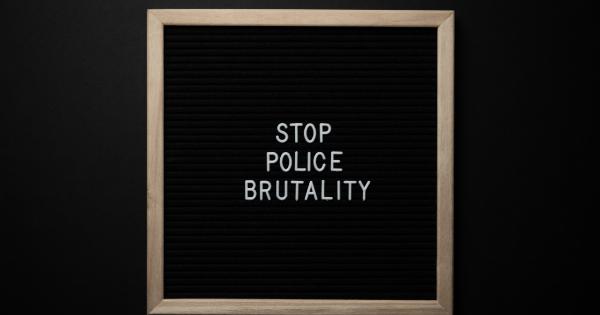False confessions are a perplexing phenomenon that continues to puzzle psychologists, law enforcement officials, and the general public. It is difficult for many to comprehend why anyone would confess to a crime they did not commit.
However, research has shown that false confessions are more common than previously believed, and understanding the psychological factors that contribute to this phenomenon is vital. In this article, we will delve into the psychology of false confessions and explore why innocent people sometimes admit guilt.
The Need for Closure and the Pressure to Confess
One of the primary reasons innocent individuals may falsely confess is the inherent human need for closure. When a crime occurs, there is often immense pressure on law enforcement to solve the case promptly.
This pressure can lead investigators to use aggressive interrogation tactics, such as prolonged questioning, sleep deprivation, and even physical or psychological coercion.
Under these circumstances, individuals may experience extreme stress, anxiety, and confusion.
In some cases, innocent suspects may falsely internalize the guilt, believing that confessing will bring the interrogation to an end and provide relief from the torment they are experiencing. The desire for closure and an end to the interrogation becomes overwhelming, leading them to admit to a crime they did not commit.
Misunderstanding of Evidence and Coercive Interrogation
Another contributing factor to false confessions is the misunderstanding of evidence. During interrogations, investigators often possess detailed information about the crime, which they use strategically to convince the suspect of their guilt.
This information can be misleading and may create a sense of guilt in the innocent individual’s mind, leading them to doubt their own memory or believe they committed the crime unknowingly.
Additionally, coercive interrogation techniques can cause innocent individuals to doubt their own innocence.
The intense psychological pressure, manipulation, and deception employed by interrogators can wear down the suspect’s resistance and make them question their own memory and perception of events. This self-doubt can ultimately lead to the manifestation of a false confession.
Psychological Vulnerability and False Memories
False memories play a significant role in the creation of false confessions. Our memories are not infallible, and they can be influenced by various factors, including leading questions, suggestions, and misinformation.
When innocent individuals face persistent and suggestive questioning during an interrogation, it can trigger the formation of false memories.
Moreover, some individuals are more psychologically vulnerable than others.
Factors such as fatigue, stress, trauma, cognitive impairments, suggestibility, and a strong desire for approval can increase susceptibility to false memories and false confessions. These vulnerabilities make individuals more likely to internalize the interrogator’s accusations and create a false narrative to fit the given circumstances.
Lack of Awareness and Trust in the Legal System
Many innocent individuals falsely confess because they trust in the infallibility of the legal system. They assume that their innocence will be established during the trial phase, and any confession they make will be proven false.
However, this is not always the case. Juries tend to perceive confessions as strong evidence of guilt, and it can be challenging to convince them otherwise.
Furthermore, some innocent individuals lack awareness of their rights and may not fully understand the long-term consequences of confessing.
They may believe that cooperating with law enforcement will lead to a quicker resolution or a reduced punishment, even though this may not be the case.
The Influence of Personality Factors
Personality traits and individual differences can also play a role in false confessions. Some individuals possess a strong need for obedience and a desire to please authority figures.
These personality characteristics make them more susceptible to making false confessions if they perceive that it will please the interrogator and bring the interrogation to an end.
Additionally, people with low self-esteem or feelings of guilt and shame may be more likely to falsely confess.
They may believe that confessing will alleviate their negative emotions or punish them for imagined transgressions, serving as a form of self-punishment.
The Consequences of False Confessions
False confessions have severe consequences, not only for the innocent individuals who admit guilt but for the criminal justice system as a whole.
Innocent people who falsely confess may face wrongful convictions, loss of reputation, damage to personal relationships, psychological trauma, and even imprisonment for crimes they did not commit.
Moreover, false confessions divert investigative resources away from finding the actual perpetrator of the crime.
Instead of pursuing the truth, law enforcement may focus their efforts on building a case around the confession, potentially allowing the true offender to roam free and commit additional crimes.
Preventing False Confessions and Ensuring Justice
Efforts to prevent false confessions should encompass reforms in the legal system and improvements in police practices.
Implementing mandatory recording of all interrogations can provide a transparent account of the events and prevent or identify coercion and misconduct. Additionally, law enforcement personnel should receive extensive training on proper interrogation techniques, the psychology of false confessions, and the identification of potential indicators of innocence.
Moreover, educating the public about the psychology of false confessions can help individuals understand their rights and make informed decisions during interrogations.
Improving access to legal counsel and providing support for vulnerable individuals during the interrogation process is also vital in ensuring justice is served.
Conclusion
False confessions are a complex psychological phenomenon that can have devastating effects on innocent individuals and the criminal justice system.
Understanding the factors that contribute to false confessions, such as the need for closure, coercive interrogation techniques, false memories, and trust in the legal system, is crucial in preventing and addressing this issue. By implementing reforms and improving police practices, we can strive towards a criminal justice system that ensures justice for all.































